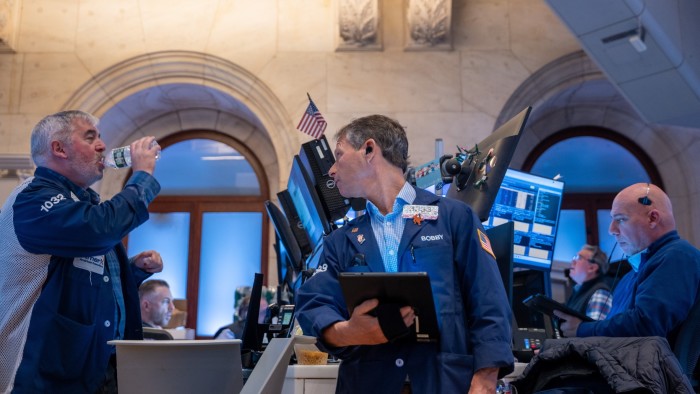Unlock the White House Watch newsletter for free
Your guide to what the 2024 US election means for Washington and the world
This week, we witnessed “the greatest economic master strategy from an American President in history”, according to Stephen Miller, adviser to Donald Trump.
The US president’s U-turn from most of his aggressive trade tariffs was “brilliantly executed”, billionaire backer Bill Ackman opined. “Textbook, Art of the Deal.”
Someone should tell investors about this astounding act of genius, as they do not appear to have got the memo. US stocks screamed higher in the immediate aftermath of Trump’s big blink, chalking up one of the biggest jumps on record. But the next day, the picture was not a pretty one for Team Maga: a sweep higher in markets from Asia to Europe, but a big drop in the US. The US dollar, which failed to attract its usual safety-seeking buyers during Trump’s mini crisis, fell further once the president took a step back on tariffs, and further still when US stocks resumed their slide.
Over-interpreting short-term moves is a risk here. But this does all suggest some difficult truths for the US administration: stock investors would rather put money to work elsewhere, and the country’s core financial assets — Treasuries and the dollar — are losing the sheen of global hegemonic dominance that they have enjoyed for decades. The trust has gone, or at least weakened significantly, and it is hard to see what can bring it back while Trump is in the White House, or even beyond.
Markets are about spreadsheets and numbers blinking on a screen, but they are also driven by nebulous things such as vibes and reputation. For the US, they rest on features that investors have never seriously questioned before: the rule of law, sensible policymaking and robust independent institutions. Trump has thrown all this into question.
Other smaller countries and markets can share lessons on how this tends to pan out. UK markets are still treading on eggshells more than two years after Liz Truss set fire to the gilt market. Every time the new-ish Labour chancellor Rachel Reeves opens her mouth, holders of UK government bonds fear a rerun. The market is scarred. Japan is still working hard to convince global asset managers to trust its stock market 30-odd years after its implosion. Investors still fear the false dawns.
It takes time to dismantle positive or negative stereotypes, without a major shock. In the US, that major shock is Trump. For investors all over the world, US stocks and bonds have for years been “home”. US assets occupy a far larger slice of the average investor’s portfolio than the relative size of its economy, in the order of 60 per cent of global stock indices or 70 per cent of developed markets. Its government bonds form the bedrock of the financial system.
For decades, parking money in the US has been the routine, fuss-free, neutral option. Anything else requires more brain power, more analysis, more justification. This is breaking down. US Treasuries are behaving more like flighty, mildly adventurous UK gilts. Some are even comparing them to emerging market bonds: the “EM-ification” of the US is the big theme in market circles this week.
The interaction of politics, trade and markets is also not helpful for the US. Crushing trade with China crushes China’s need to hold dollars. Does Trump really want to see what happens if that demand evaporates? A fixation has developed around whether China could be selling its dollar holdings at this point. That’s not the right question. The point is that it may not need to accumulate more, at least not at the typical pace. The effect is still potentially nasty for US borrowing costs.
The optimistic case is that we have passed peak stupid. Markets did impose some discipline on Trump’s more outlandish instincts on tariffs this week and perhaps, now, some of the adults in the room can guide future economic policy on a less confrontational footing.
But as former Polish leader Lech Wałęsa once remarked, you can’t turn a fish soup back into an aquarium. It is hard to see a path back to normality.
China aside, Trump has climbed down. But what is to stop him changing his mind again? What is to stop his successor from trying a rerun? Long-term investors are in no mood to do this every four to eight years.
So, a risk premium will sit on US assets that was not there before. The Trump premium, if you will.
When the recovery begins, and it will — or at least always has done over history — do not expect the US to dominate in the way it always has. Its stocks carry political risk for the first time. Its bonds no longer act like they are truly risk-free. The dollar is not acting like a magnet during periods of stress, nor like a currency anticipating an upswing in American economic growth.
In contrast to this gloom, Europe has just as strong an investment case now as it did two weeks ago. It is serious about boosting the adoption of the euro as a reserve currency, and it is deepening its internal financial integration. Is it over-regulated and slower-moving? Sure. But is it blowing up historic geopolitical alliances and playing chicken with global trade? No.
Whatever happens next, US markets will bear a scar that lasts.
Read the full article here




